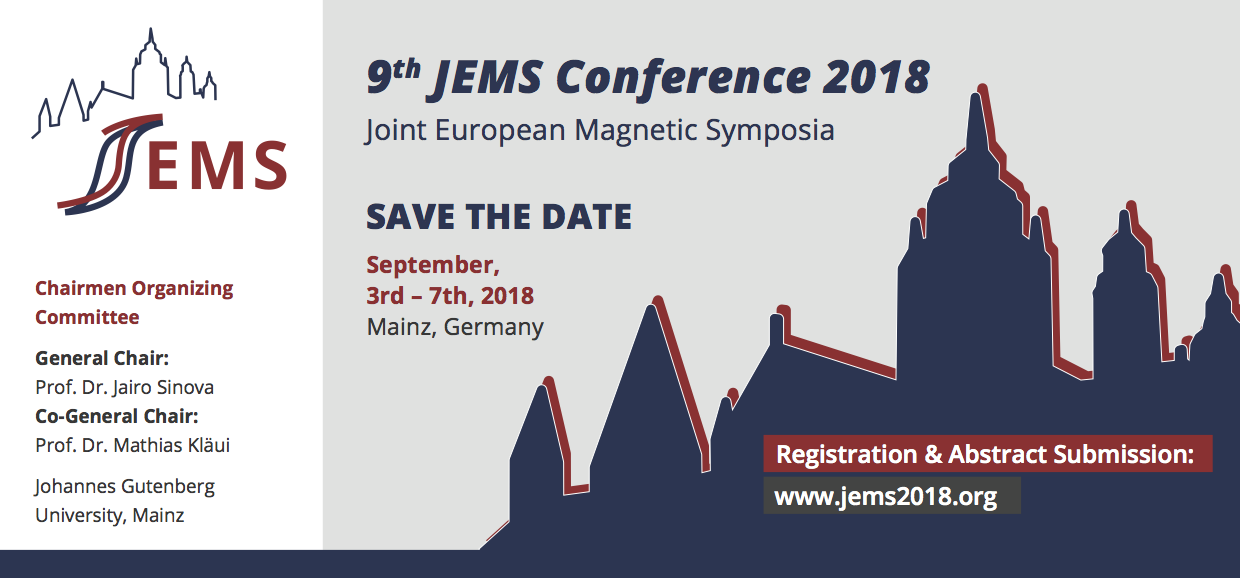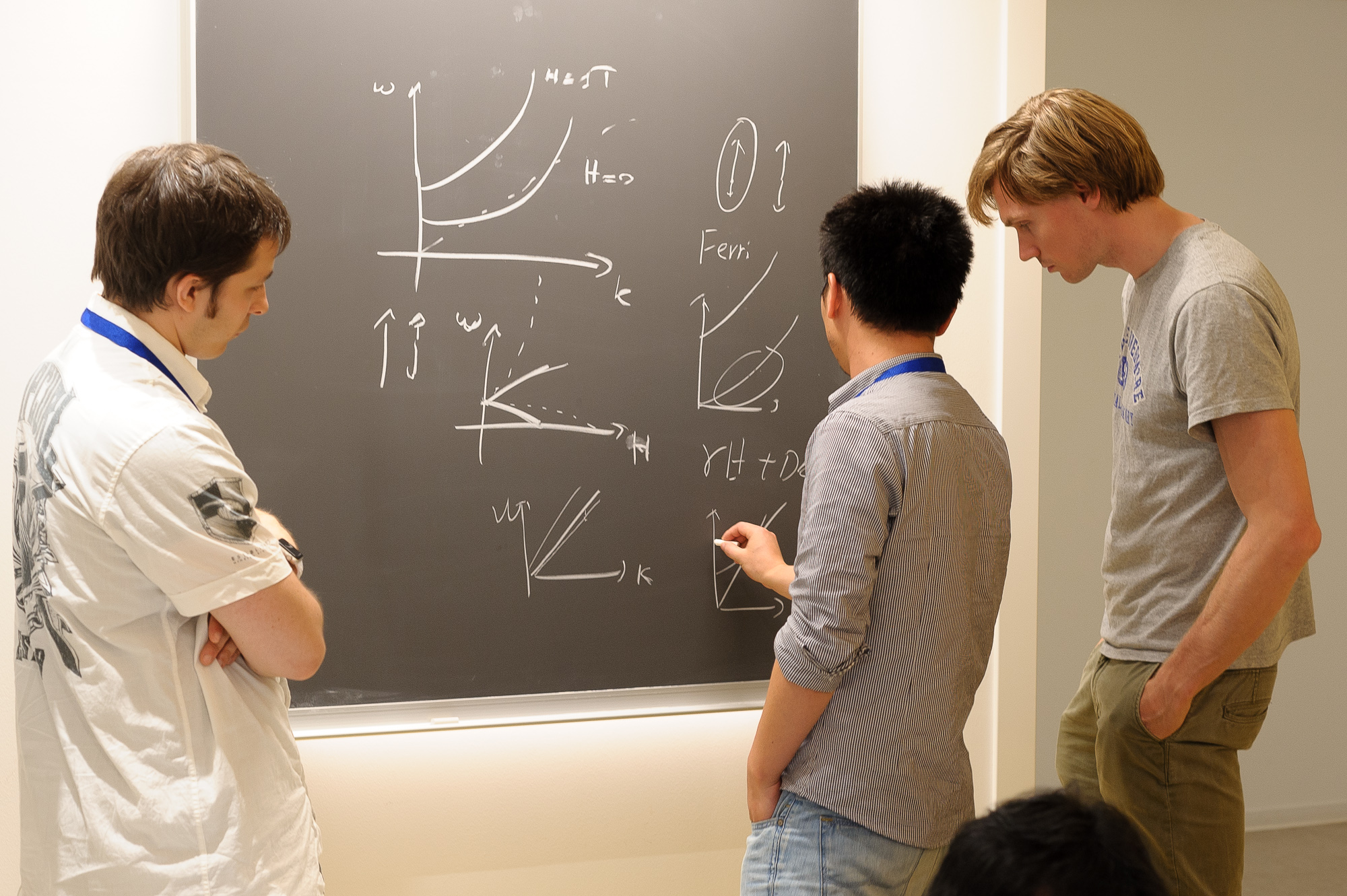News and posts
Tutorial: The Landscape of Deep Learning: a Quick Overview
All-optical switching and brain-inspired concepts for low energy information processing
Time: Monday, October 8th, 14:00
Speaker: Theo RASING, Radboud University
The explosive growth of big data and artificial intelligence offers a huge potential for new digital products and unexplored business models. While data has become an indispensable part of modern society, the sheer amount of data being generated every second is breathtaking, both in its scale and in its growth, while the number of devices generating these data is rapidly expanding. This not only pushes current technologies to their limits, but also that of our energy production: our ICT and data centres already consume around 7% of the world’s electricity production and with the growth rate of ICT-technologies, this energy consumption is rapidly becoming unsustainable. In stark contrast, the human brain, with its intricate architecture combining both processing and storing of information, only consumes about 10 Watt of energy while having a similar capacity as a supercomputer consuming around 10 Megawatt.
We try to develop materials and concepts that mimic the efficiency of the brain by combining local processing and storage, using adaptable physical interactions that can implement learning algorithms. We demonstrate, by modelling, that a reconfigurable and self-learning structure can be achieved, which implements the prototype perceptron model of a neural network based on magneto-optical interactions. Importantly, we show that optimization of synaptic weights is achieved by a global feedback mechanism, such that learning does not rely on external storage or additional optimization schemes. For the experimental realization of adaptive synaptic structures, we choose to use optically controllable magnetization in a thin Co/Pt film1, using circularly polarized picosecond2 pulse trains. The combined stochastic/deterministic nature of all-optical switching in this material2 offers the possibility to continuously vary the magneto-optical Faraday rotation with the number of pulses, yielding the necessary ingredient to realize a perceptron-like structure. First results of such a learning structure will be demonstrated.
1. C.-H. Lambert et al, Science 345, 1337 (2014)
2. R. Medapalli et al, Phys. Rev.B 96, 224421 (2017)
03.09.2018 – Joint European Magnetic Symposia

Joint European Magnetic Symposia 2018
JEMS covers a wide breadth of cutting-edge topics in magnetism and magnetic materials research, ranging from the fundamental to the applied. The topics cut across the entire field of magnetism, such as biomangetism applications, chiral magnetism and skyrmions, multiferroics, strongly correlated systems, topological magnetic materials, ultrafast optical spintronics, and magnonics.
The conference incorporates plenary and semi-plenary talks from internationally renowned speakers, representing the latest advances in magnetism. Attendees are also able to contribute to specific symposia through talks and poster sessions focused on their research topics.
Mainz and the Rheinpfalz region are important centers of magnetism research in Germany. The Kaiserslautern-Mainz collaborative center SPIN+X and the Spin Phenomena Interdisciplinary Center (SPICE) lead many of these efforts.
10.07.2018 – Young Research Leaders Group Workshop

YRLG: Collective phenomena in driven quantum systems
The workshop explored situations in which non-equilibrium setups can provide information about many-body systems that cannot be accessed in conventional (linear-response based) probes. Systems of particular interest are materials with strongly competing or frustrated (by disorder, relativistic corrections or geometrical constrains) interactions, or those under extreme quantum conditions (traditionally, very low temperatures and/or very high magnetic fields). These circumstances favor the formation of phases characterized by some sort of topological order, revealing highly entangled ground states and exotic, but experimentally elusive, excitations. Topology provides also the unifying framework to describe the emergence of quantum coherence at the macroscopic scale. These current efforts in solid state goes hand by hand with the design and large-scale control of new types of synthetic quantum matter in driven optical and atomic systems.
15.05.2018 – Spin Cavitronics

Spin Cavitronics
Cavity (quantum) electrodynamics, originally invented in order to enhance matter-light interaction in atomic physics, has developed into an ubiquitous technique to study condensed matter systems, such as semiconductor quantum dots, diamond NV centers, donor spins in silicon, Josephson-junction qubits, nanomechanical systems, etc. Recently, ferromagnets in cavities have been shown to hybridize with microwaves and (more weakly) with light photons. We observe now the emergence of the interdisciplinary field “Spin Cavitronics” that brings together the optical and microwave cavity communities with researchers from magnetism and spintronics, also involving superconductivity, plasmonics, phononics, mechanics, and AMO groups. The present workshop is intended to facilitate interaction between the leaders of these fields and lure prospective newbies.
08.05.2018 – Quantum Thermodynamics and Transport

Quantum Thermodynamics and Transport
The purpose of this conference was to bring together researchers from the communities of condensed matter, statistical physics, quantum optics and atomic physics with the aim of discussing quantum effects on transport and thermodynamics. The following topics were covered: quantum heat and work, time-dependent drivings, thermoelectrics, quantum fluctuations, coherence and entanglement. The meeting contributed to the understanding of fundamental properties of quantum matter out of equilibrium as well as to the development of novel nanodevices.
20.12.2017 – Job offer: PhD Position in Spintronics in the Institute of Physics at the Johannes Gutenberg-Universität Mainz
Johannes Gutenberg-Universität Mainz, Germany
We are pleased to announce the opening of two PhD positions in theoretical condensed matter in the Institute of Physics at the Johannes Gutenberg-Universität Mainz to work with the spintronics theory groups INSPIRE (Jairo Sinova) and TWIST (Karin Everschor- Sitte) on topics such as antiferromagnetic spintronics, skyrmions, and topological matter. The physics institute and the Spin Phenomena Interdisciplinary Center (SPICE) provides a stimulating environment due to an active workshop program and a broad range of research activities.
The prospective group member must hold a MSc or equivalent diploma. A background in theoretical techniques in condensed matter physics is required. Candidates interested and/or experienced in spintronics, magnetization dynamics, the physics of antiferromagnetics or skyrmions, and micromagnetic modelling are highly suited for this opportunity. Programming experience is desired.
Further information can be found on the websites: https://www.inspire.uni-mainz.de or http://www.twist.uni-mainz.de/
Johannes Gutenberg-Universität Mainz is an equal opportunity, affirmative actions employer in compliance with German disability laws. Women and persons with disabilities are encouraged to apply.
Review of applications begins immediately and will continue until the position is filled. Interested applicants should send a curriculum vitae, a list of publications, and at least two letters of recommendation to sinova-group@uni-mainz.de. When sending applications please use the subject line “Spintronics PhD position application”.
Prof. Jairo Sinova
Head of the group INSPIRE
Director of SPICE
Dr. Karin Everschor-Sitte
Head of Emmy Noether Research Group TWIST
Scientific Coordinator of SPICE
Johannes Gutenberg-Universität Mainz FB 08 – Institut für Physik Staudingerweg 7
55128 Mainz
Germany
25.09.2017 – Exotic New States in Superconducting Devices

Exotic New States in Superconducting Devices: The Age of the Interface
Superconducting material such as a ferromagnet, a topological insulator or a semiconductor, a range of electronic states can be induced which are radically different from either constituent material. To be able to probe these states requires a broad range of expertise, spanning basic materials science to fundamental physics modeling of interfaces and transport behaviour. At this meeting we have the opportunity to bring together scientists working on distinct and overlapping areas, such as superconductivity, magnetism, topological materials, quantum computing, and spin-electronics. This science community will have an opportunity to appreciate how these different transport phenomena are linked conceptually and thereby stimulate further understanding particularly with respect to realising useful devices with unique properties for spin-electronics and quantum computing.
25.10.2017 – Antiferromagnetic Spintronics
Antiferromagnetic Spintronics
Antiferromagnetic materials could represent the future of spintronics thanks to the numerous features they combine: they are robust against perturbation due to magnetic fields, produce no stray fields, display ultrafast dynamics and generate large magnetotransport effects. Research efforts invested in unraveling spin-dependent transport properties of antiferromagnets were presented and discussed in this workshop.
31.07.2017 – Young Research Leaders Group Workshop

Insulator spintronics – strong-coupling, coherence and entanglement
Magnetic insulators are extremely versatile materials. They’re used for fundamental research into magnetism and in real world devices. They have become a vital tool across many research disciplines to the extent that they are now micro-scale laboratories in their own right. The lack of charge currents in these materials allows for a very controlled environment where pure spin currents can flow and single magnons can be excited. However, nature is not so kind and the majority of magnetic insulators are a complex class of materials with many complications which must be understood.
This SPICE Young Research Leaders Workshop aims to bring together young scientific leaders who are interested in how magnetic insulators can be used to push the frontier of our understanding of basic science as well as technological frontiers such as spintronics and quantum computing. Specifically, this workshop will bring together researchers from the fields of insulator spintronics, magnon-polaritons and quantum magnetism to exchange ideas and discuss new ways in which magnetic insulators can be applied to fundamental research and applications.
